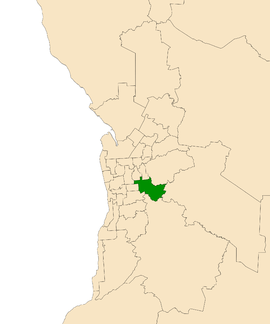Electoral district of Bragg
| Bragg South Australia—House of Assembly | |
|---|---|
 Electoral district of Bragg (green) in the Greater Adelaide area | |
| State | South Australia |
| Created | 1970 |
| MP | Vickie Chapman |
| Party | Liberal Party of Australia (SA) |
| Namesake | William Henry Bragg and William Lawrence Bragg |
| Electors | 25,104 (2014) |
| Area | 60.4 km2 (23.3 sq mi) |
| Demographic | Metropolitan |
| Coordinates | 34°57′30″S 138°41′39″E / 34.95833°S 138.69417°ECoordinates: 34°57′30″S 138°41′39″E / 34.95833°S 138.69417°E |
Bragg is an electoral district of the House of Assembly in the Australian state of South Australia. The seat of Bragg is named after the eminent physicists Bragg – William Henry and his son, William Lawrence. The electorate is largely urban and encompasses a significant portion of the City of Burnside, stretching from the east parklands of Adelaide into the Adelaide Hills. After a redistribution following the 2006 election, the boundary moved eastwards to include suburbs that had formerly been in the seat of Heysen and now borders Kavel. Bragg currently includes the metropolitan suburbs of Beaumont, Burnside, Dulwich, Erindale, Hazelwood Park, Heathpool, Kensington Park, Leabrook, Linden Park, Rose Park, Marryatville, Skye, St Georges, Stonyfell, Toorak Gardens, Tusmore, Wattle Park and parts of Glen Osmond, and in the hills it includes Crafers, Cleland, Greenhill, Mount Osmond, Piccadilly, Summertown and parts of Ashton, Basket Range, Carey Gully, Horsnell Gully, Leawood Gardens and Uraidla.
The seat was first contested at the 1970 election as a replacement for the abolished, larger seat of Burnside, one of fifteen new seats created in Adelaide in order to give the capital fairer representation. It has been held by the Liberals for its entire existence, and for most of that time has been the most conservative seat in the capital. As a measure of the strong Liberal support in this seat, the Liberals won primary vote majorities even in the Labor landslides of 1977, 1985 and 2006. The Liberals won Bragg in 2006 with a comfortable majority of 12.6 percent, the only safe metropolitan Liberal seat and one of only four safe Liberal seats statewide. Bragg is currently the safest Liberal seat in Adelaide, with Labor needing an 18.7 percent swing to win it.
Bragg's best-known member is David Tonkin who served as Premier of South Australia from 1979 to 1982. He resigned shortly after the Liberals lost the 1982 state election. The ensuing 1983 Bragg by-election was easily retained by fellow Liberal Graham Ingerson, who went on to become a minister under Dean Brown and John Olsen and served as Deputy Premier of South Australia under Olsen from 1996 to 1998. Ingerson retired in 2002 and was succeeded by incumbent Vickie Chapman, two time Liberal leadership challenger and two time Liberal deputy leader from 2006 until 2009 and again since 2013.
Members for Bragg
| Member | Party | Term | |
|---|---|---|---|
| David Tonkin | Liberal and Country | 1970–1974 | |
| Liberal | 1974–1983 | ||
| Graham Ingerson | Liberal | 1983–2002 | |
| Vickie Chapman | Liberal | 2002–present | |
Election results
| Party | Candidate | Votes | % | ± | |
|---|---|---|---|---|---|
| Liberal | Vickie Chapman | 15,033 | 65.7 | +2.6 | |
| Labor | Ella Waters | 4,958 | 21.7 | +0.1 | |
| Greens | Ami Harrison | 2,891 | 12.6 | +0.4 | |
| Total formal votes | 22,882 | 98.3 | +0.2 | ||
| Informal votes | 400 | 1.7 | −0.2 | ||
| Turnout | 23,282 | 92.7 | +0.3 | ||
| Two-party-preferred result | |||||
| Liberal | Vickie Chapman | 15,711 | 68.7 | −1.5 | |
| Labor | Ella Waters | 7,171 | 31.3 | +1.5 | |
| Liberal hold | Swing | −1.5 | |||